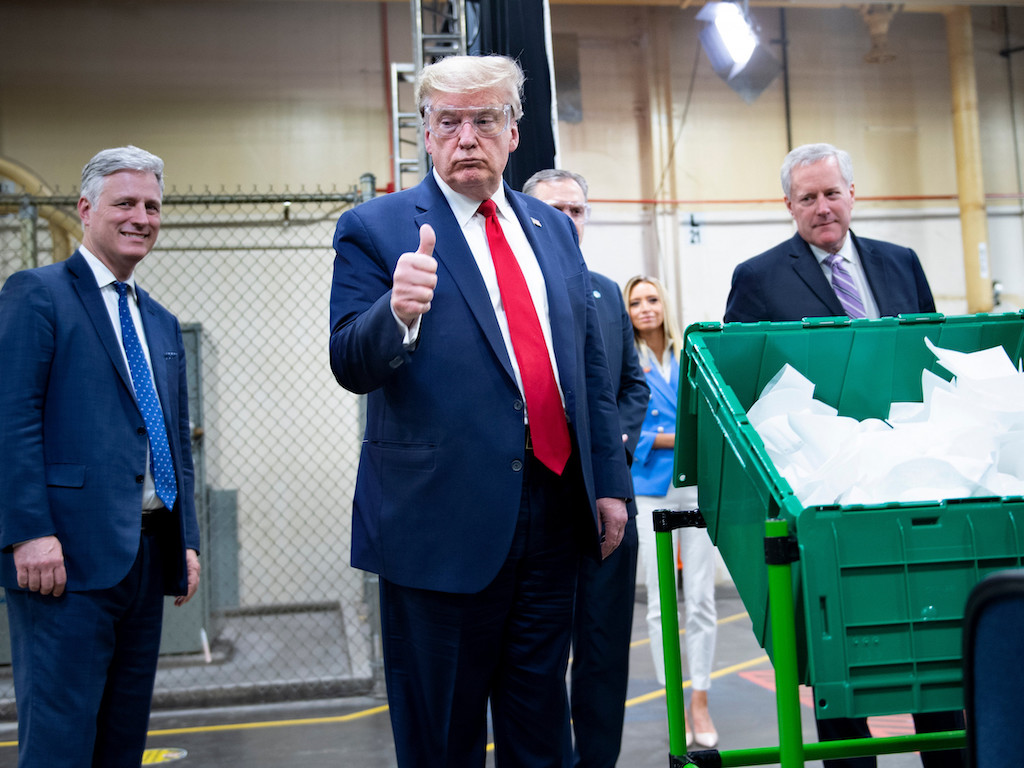4 Mins Read
By: Jenessa Duncombe
People untroubled by climate change are more likely to forgo masks in public.
According to a recent poll by the technology company Morning Consult, the decision to wear a mask in the United States correlates with an individual’s concern about climate change.
In an online survey of 2,200 adults on 14–16 April, a little over half of respondents who said climate change was a concern and caused by human activity said they “always” wear masks in public. In contrast, a little under a third of respondents “not too concerned” or “not concerned at all” with climate change said the same. There was a 24–percentage point difference between the two (54% versus 30%).
Vice President Mike Pence and President Donald Trump have repeatedly made headlines for bypassing masks in public, although Pence later said he should have worn one when visiting the Mayo Clinic in April. The Centers for Disease Control and Prevention (CDC) recommends wearing masks in public places where social distancing may be difficult, like grocery stores and pharmacies. The masks help reduce the spread of coronavirus disease 2019 (COVID-19).
The poll reveals how a person’s concern about one public health crisis—climate change—is related to their behavior during another. The coronavirus pandemic has claimed more than 85,000 lives in the United States and over 300,000 worldwide, according to Johns Hopkins University. Individual beliefs about science and personal choices inform behavior during the pandemic, according to experts interviewed by Morning Consult.
Face-to-Face
Wearing a mask in public could prevent the transmission of the virus by blocking aerosols and droplets from an infected person’s mouth and nose. People without symptoms can still spread the virus through their saliva and mucus through coughing, sneezing, or breathing.
Some view ordinances to wear masks as affronts on their personal liberties. A person’s opposition to expert advice, skepticism of science, and personal autonomy concerns may explain the difference.
“For a lot of people, the coronavirus is invisible, just like climate change is invisible.”
“Everything that science asks us to do is really sacrificing personal convenience for community convenience and well-being,” Emma Frances Bloomfield, an assistant professor in communication studies at the University of Nevada, Las Vegas, toldMorning Consult. “And for a lot of people, the coronavirus is invisible, just like climate change is invisible. A lot of people don’t know people who have been directly affected, and in the case of climate change, a lot of the more severe effects are still years away.”
Respondents in the poll were more in agreement about other preventative measures. Of all adults polled, 78% said they were following social distancing guidelines during the previous month. Climate-unconcerned individuals were only slightly less likely (72%) than climate-concerned respondents (86%). The two groups also found some common ground in cleaning practices: 50% of climate-unconcerned individuals reported cleaning and disinfecting home surfaces and technology, compared with 61% of climate-concerned individuals.
The poll had a margin of error of two percentage points for all respondents and three to four percentage points for the climate-concerned and -unconcerned groups.
Making a Masquerade of Science
For decades, fossil fuel companies spent hundreds of millions of dollars to spread misinformation about climate change, and this undermined public confidence in science, said Ed Maibach, director of the Center for Climate Change Communication at George Mason University.
“It’s a really unfortunate consequence of that disinformation campaign that’s been playing out so long.”
Maibach told E&E News, “it’s a really unfortunate consequence of that disinformation campaign that’s been playing out so long.…And with regard to the COVID-19 pandemic, it’s really important that we listen to what the public health experts have to say about this because lives are on the line.”
Liberal Democrats are more likely to be concerned about climate change than conservative Republicans, noted Maibach. Sixty-five percent of the climate-unconcerned respondents identified as conservative, and 36% identified as Baby Boomers. Bloomfield said that conservatives and older generations are less willing to make personal sacrifices based on their ideologies, which go against both environmentalism and certain COVID-19 protective measures.
The CDC did not recommend that the public wear masks until early April. The change came when the CDC noted studies that showed people without symptoms could still spread the virus. The Morning Consult poll was conducted in mid-April, so opinions and behaviors may have shifted since.
North Carolina State University assistant professor Louie Rivers sees the poll as evidence of agreement across party lines. Rivers, who focuses on the examination of risk and judgment and decision process in minority and marginalized communities, pointed out to Inside Climate News that the majority of respondents said they were social distancing.
“To me, that’s hopeful,” Rivers said. “A lot of Americans, they’re losing their jobs, they’re having problems putting food on the table, and yet they’re staying at home and sharing the sacrifice.”

This story originally appeared in AGU’s Eos Magazine and is republished here as part of Covering Climate Now, a global journalistic collaboration to strengthen coverage of the climate story.
Lead image courtesy of Brendan Smialowski / Getty Images.




